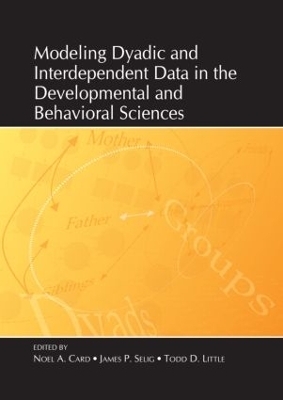
Modeling Dyadic and Interdependent Data in the Developmental and Behavioral Sciences
Routledge (Verlag)
978-0-8058-5973-7 (ISBN)
This book reviews methods of conceptualizing, measuring, and analyzing interdependent data in developmental and behavioral sciences. Quantitative and developmental experts describe best practices for modeling interdependent data that stem from interactions within families, relationships, and peer groups, for example. Complex models for analyzing longitudinal data, such as growth curves and time series, are also presented.
Many contributors are innovators of the techniques and all are able to clearly explain the methodologies and their practical problems including issues of measurement, missing data, power and sample size, and the specific limitations of each method.
Featuring a balance between analytic strategies and applications, the book addresses:
The Actor-Partner Interdependence Model for analyzing influence between two individuals
The Intraclass Correlational Approach for analyzing distinguishable roles (parent-child) or exchangeable (same-sex) dyadic data
The Social Relations Model for analyzing group interdependency
Social Network Analysis approaches for relationships between individuals
This book is intended for graduate students and researchers across the developmental, social, behavioral, and educational sciences. It is an excellent research guide and a valuable resource for advanced methods courses.
Noel A. Card is Assistant Professor of Family Studies and Human Development at the University of Arizona. He received his PhD in Clinical Psychology from St. John’s University. James P. Selig is a Doctoral Candidate in Quantitative Psychology at the University of Kansas. Todd D. Little is Director of the Research Design and Analysis Unit and Director of the Quantitative Psychology doctoral training program at the University of Kansas. He received his PhD in Developmental Psychology from the University of California at Riverside.
N.A. Card, T.D. Little, J.P. Selig, Modeling Dyadic and Interdependent Data in Developmental Research: An Introduction. B. Laursen, D. Popp, W.J. Burk, M. Kerr, H. Stattin, Incorporating Interdependence into Developmental Research: Examples from the Study of Homophily and Homogeneity. W.L. Cook, Application of the Social Relations Model Formulas to Developmental Research. A.H.N. Cillessen, C. Borch, Analyzing Social Networks in Adolescence. N. Ram, A.B. Pedersen, Dyadic Models Emerging from the Longitudinal Structural Equation Modeling Tradition: Parallels with Ecological Models of Interspecific Interactions. E. Ferrer, K.F. Widaman, Multilevel Structural Equation Models for Contextual Factors with Inter-Group Differences. P. Sadler, E. Woody, It Takes Two: A Dyadic, SEM-Based Perspective on Personality Development. D.A. Kashy, M.B. Donnellan, Comparing MLM and SEM Approaches to Analyzing Developmental Dyadic Data: Growth Curve Models of Hostility in Families. J.P. Selig, K.A. McNamara, N.A. Card, T.D. Little, Techniques for Modeling Dependency in Interchangeable Dyads. T.E. Malloy, A.H.N. Cillessen, Variance Component Analysis of Generalized and Dyadic Peer Perceptions in Adolescence. N.A. Card, T.D. Little, J.P. Selig, Using the Bivariate Social Relations Model to Study Dyadic Relationships: Early Adolescents’ Perceptions of Friends’ Aggression and Prosocial Behavior. S.J.T. Branje, C. Finkenauer, W.H.J. Meeus, Modeling Interdependence Using the Social Relations Model: The Investment Model in Family Relationships. J. Templin, Methods for Detecting Subgroups in Social Networks. T.A. Kindermann, Can We Use Causal Inferences about the Influence of Children's Naturally-Existing Social Networks on their School Motivation? B.J.H. Zijlstra, R. Veenstra, M.A.J. Van Duijn, An Application of the Multilevel Model for Binary Network Data on Bully-Victim Relationships. C.F. Bond, Jr., D. Cross, Beyond the Dyad: Prospects for Social Development. D.A. Kenny, Thinking about the Developmental Course of Relationships.
| Erscheint lt. Verlag | 29.8.2008 |
|---|---|
| Verlagsort | New York |
| Sprache | englisch |
| Maße | 152 x 229 mm |
| Gewicht | 612 g |
| Themenwelt | Geisteswissenschaften ► Psychologie ► Allgemeine Psychologie |
| Geisteswissenschaften ► Psychologie ► Entwicklungspsychologie | |
| Geisteswissenschaften ► Psychologie ► Test in der Psychologie | |
| Sozialwissenschaften ► Pädagogik ► Erwachsenenbildung | |
| ISBN-10 | 0-8058-5973-X / 080585973X |
| ISBN-13 | 978-0-8058-5973-7 / 9780805859737 |
| Zustand | Neuware |
| Haben Sie eine Frage zum Produkt? |
aus dem Bereich


